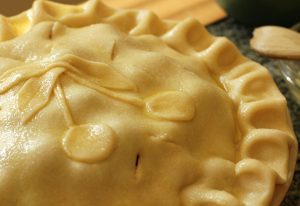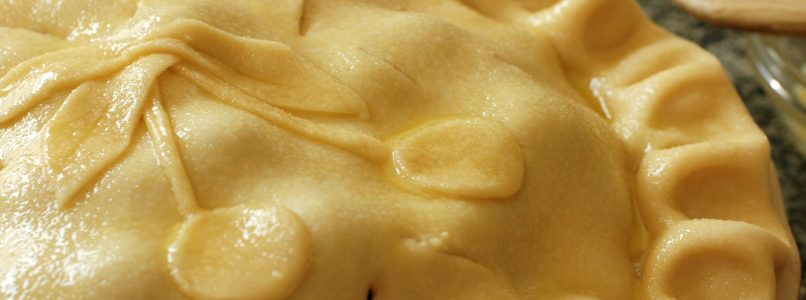Kids, Adults, and Pie
 In honor of the Great American Pie Month, I want to share a story that illustrates the difference between kids and adults. Understanding this can make all the difference in how much you enjoy being and working with them and it can also impact your enjoyment whenever you learn something new.
In honor of the Great American Pie Month, I want to share a story that illustrates the difference between kids and adults. Understanding this can make all the difference in how much you enjoy being and working with them and it can also impact your enjoyment whenever you learn something new.
I taught a class on pie making to a group of adults. One mother brought her 11-year-old daughter and they worked together.
When I teach someone how to make a pie, I know that their pie won’t look like mine. I’ve been making pies for over fifty years and when I roll out a pie crust it’s round and beautiful. When I put it into the pie pan it’s as smooth as butter; no cracking, no tearing. When I crimp the edges, they look so taste-tempting and are, in fact, delicious. It’s all because I’ve had so much practice.
People learning to make a pie for the first time, no matter their age, have had very little to no practice. Rolling a pie crust out so that its round is a skill that must be learned. Picking up a pie crust and fitting it into the pan without tears and cracks is a skill that must be learned. It’s a skill to make the crust just right, not to dry and not to wet.
I have taught many people to make pie and I want my new pie makers to go home feeling like they just accomplished something magnificent. So, I tell them “You’re just learning this new skill. It’s like riding a bike, it won’t be perfect right off the bat. Your crust might not fit the pan perfectly, it might even crack. Just piece it back together. You’re making this pie because you love your family and they’re going to be so blessed to have it. Remember that it’s going to taste wonderful and how it tastes is what’s going to count, not how it looks.”

Well, all my pie makers got to work, including the mother-daughter team. The pies were turning out just as you would expect beginner’s pies to look. Everyone had taken my counsel and was feeling successful except Rosemary, the older half of the mother-daughter team. She wanted it to be perfect, she wanted to be able to do it better on the first try, how it was turning out is what mattered to her.
She was fretting and stewing over the fact that it hadn’t been very round, the dough was dry, it broke into a couple of pieces and had to be pressed back together as they were putting it into the pan. Her daughter was just busy piecing away. Finally, Ariel looked at her mom and said: “Remember mom, it’s how it tastes that counts.” Her mother looked at her for a bit and then replied, “Oh yes, thanks for reminding me.”
Outcome vs Process
Teaching adults can be difficult. They worry about not knowing the material already or not having the skill. They are embarrassed that their results don’t look like yours.
Adults are outcome (product) driven while children are process driven. How it turns out can eclipse the joy of doing whatever it is. This difference can get in the way of enjoying working with your children
Teaching children is a joy. It always amazes me that my pie looks perfect and theirs is crumbling on the side and they don’t see the difference. They look at the pie and say, “Wow, look at my pie.” They’re proud and excited about what they have done. It is the process that they enjoy.
Why Children Enjoy The Process:
1. They are teachable because they aren’t intimidated by not already knowing how to do something. They are excited to learn.
2. They are not afraid to learn new things.
3. The process is more important than the outcome. They are willing to be less than perfect while they learn. In fact, they usually cannot even see the imperfections unless they are pointed out by an adult. That is why we need to be gentle when we are helping a child learn something new.
4. The mess or time it takes isn’t important to them. They don’t worry about the use of resources.
5. They are so easy to please.
As you look at this list can you see the things that make you crazy when you are letting your kids paint, cut, or are trying to teach them to clean or garden, etc?
The end result matters a lot to you. You don’t want a mess. You don’t want wasted paper, glue and tape. You are concerned with time. You can see all the uncleaned corners, the crooked edges, etc. You sometimes don’t appreciate the number of repetitions that are required to get good at something.
When you are working with your kids whether it’s a craft, cooking or doing chores together stay out of your children’s way a bit more. Give them space, time and the resources to do the job. Don’t micromanage so much. Let them learn and take pride in whatever they do. Don’t see the end result through your eyes. See it through theirs. The process is what counts for kids. Aren’t kids amazing!!!!







